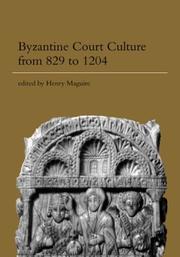| Listing 1 - 10 of 20 | << page >> |
Sort by
|

ISBN: 0198204078 019167611X Year: 1994 Publisher: Oxford Clarendon
Abstract | Keywords | Export | Availability | Bookmark
 Loading...
Loading...Choose an application
- Reference Manager
- EndNote
- RefWorks (Direct export to RefWorks)
History of Asia --- History of Greece --- anno 1100-1199 --- anno 1200-1499 --- Byzantine Empire --- Foreign relations --- Latin Orient --- 1081-1453 --- Byzantine Empire - Foreign relations - Latin Orient. --- Latin Orient - Foreign relations - Byzantine Empire. --- Byzantine Empire - Foreign relations - 1081-1453.

ISBN: 0860783383 9780860783381 Year: 1995 Volume: 1 Publisher: Aldershot : Variorum,
Abstract | Keywords | Export | Availability | Bookmark
 Loading...
Loading...Choose an application
- Reference Manager
- EndNote
- RefWorks (Direct export to RefWorks)
Byzantine Empire --- Byzantium (Empire) --- Vizantii︠a︡ --- Bajo Imperio --- Bizancjum --- Byzantinē Autokratoria --- Vyzantinon Kratos --- Vyzantinē Autokratoria --- Impero bizantino --- Bizantia --- Foreign relations --- Congresses. --- Byzantine Empire - Foreign relations - Congresses
Book
ISBN: 9781904982951 1904982956 Year: 2012 Publisher: London Archetype Publications
Abstract | Keywords | Export | Availability | Bookmark
 Loading...
Loading...Choose an application
- Reference Manager
- EndNote
- RefWorks (Direct export to RefWorks)
Book
ISBN: 0674165357 9780674165359 Year: 1972 Volume: 88 Publisher: Cambridge (Mass.) Harvard university press
Abstract | Keywords | Export | Availability | Bookmark
 Loading...
Loading...Choose an application
- Reference Manager
- EndNote
- RefWorks (Direct export to RefWorks)
Byzantine Empire --- History --- Foreign relations --- Civilization, Medieval --- Medieval civilization --- Middle Ages --- Civilization --- Chivalry --- Renaissance --- -Byzantine Empire --- -Foreign relations --- -History --- -Civilization, Medieval --- Byzantine Empire - History - Andronicus II Palaeologus, 1282-1328 --- Byzantine Empire - Foreign relations - 1081-1453
Book
ISBN: 9789004499706 9789004460928 9004460926 9004499709 Year: 2022 Publisher: Leiden; Boston : BRILL
Abstract | Keywords | Export | Availability | Bookmark
 Loading...
Loading...Choose an application
- Reference Manager
- EndNote
- RefWorks (Direct export to RefWorks)
Samuel P. Müller offers here the first book-length study of the image of Latins in Byzantine historiography of the long twelfth century, a crucial period that witnessed an unprecedented intensification of Byzantine-Western relations. He notably argues against popular assertions that the image of Latins is "negative" and reflective of steadily mounting tension. Instead, Müller shows that Byzantine historiography can hardly be taken as evidence that the conquest of 1204 was the inevitable outcome of previous interactions. The representation of Latins is complex, ambivalent, and reflective of fickle and multifaceted Byzantine-Western relations. The book also highlights the need to focus on Byzantine identities and crucial, introspective motivations to which the image of Latins is subordinated.
Byzantine Empire --- Romans - Byzantine Empire. --- Romans - Ethnic identity. --- National characteristics, Roman. --- Byzantine Empire - History - 1081-1453 - Historiography. --- Byzantine Empire - Foreign relations - 1081-1453. --- Byzantine Empire - Civilization - Roman influences. --- Romans
Book
ISBN: 9004433384 9004431802 9789004431805 9789004433380 Year: 2020 Publisher: Leiden Boston
Abstract | Keywords | Export | Availability | Bookmark
 Loading...
Loading...Choose an application
- Reference Manager
- EndNote
- RefWorks (Direct export to RefWorks)
In La Diplomatie byzantine, de l’Empire romain aux confins de l’Europe (Ve-XVe s.), twelve studies explore from novel angles the complex history of Byzantine diplomacy. After an Introduction, the volume turns to the period of late antiquity and the new challenges the Eastern Roman Empire had to contend with. It then examines middle-Byzantine diplomacy through chapters looking at relations with Arabs, Rus’ and Bulgarians, before focusing on various aspects of the official contacts with Western Europe at the end of the Middle Ages. A thematic section investigates the changes to and continuities of diplomacy throughout the period, in particular by considering Byzantine alertness to external political developments, strategic use of dynastic marriages, and the role of women as diplomatic actors. Contributors are are Jean-Pierre Arrignon, Audrey Becker, Mickaël Bourbeau, Nicolas Drocourt, Christian Gastgeber, Nike Koutrakou, Élisabeth Malamut, Ekaterina Nechaeva, Brendan Osswald, Nebojša Porčić, Jonathan Shepard, and Jakub Sypiański.
Middle Ages. --- Civilization, Medieval. --- Civilization, Medieval --- Medieval civilization --- Middle Ages --- Civilization --- Chivalry --- Renaissance --- Dark Ages --- History, Medieval --- Medieval history --- Medieval period --- World history, Medieval --- World history --- Medievalism --- History --- Byzantine Empire - Foreign relations - 527-1081 - Congresses --- Byzantine Empire - Foreign relations - 1081-1453 - Congresses --- Byzantine Empire - Politics and government - 527-1081 - Congresses --- Byzantine Empire - Politics and government - 1081-1453 - Congresses --- Byzantine Empire --- Bajo Imperio --- Bizancjum --- Bizantia --- Byzantinē Autokratoria --- Byzantium (Empire) --- Impero bizantino --- Vizantii︠a︡ --- Vyzantinē Autokratoria --- Vyzantinon Kratos --- Foreign relations --- Politics and government

ISBN: 3770520424 9783770520428 Year: 1981 Volume: 1 Publisher: München Fink
Abstract | Keywords | Export | Availability | Bookmark
 Loading...
Loading...Choose an application
- Reference Manager
- EndNote
- RefWorks (Direct export to RefWorks)
Crusades --- Byzantine Empire --- Latin Orient --- Foreign relations --- 940.181 --- Military history, Medieval --- Medieval military history --- Church history --- Middle Ages --- Chivalry --- Kruistochten --- -Latin Orient --- -Byzantine Empire --- -East, Latin --- Latin East --- Orient, Latin --- Islamic Empire --- Middle East --- Orient --- Latin Empire, 1204-1261 --- -Foreign relations --- -History --- -940.181 --- 940.181 Kruistochten --- -Crusades. --- Crusades. --- East, Latin --- Byzantium (Empire) --- Vizantii︠a︡ --- Bajo Imperio --- Bizancjum --- Byzantinē Autokratoria --- Vyzantinon Kratos --- Vyzantinē Autokratoria --- Impero bizantino --- Bizantia --- History --- Jeruzalem (Koninkrijk van). Buitenlandse betrekkingen. Byzantijns Rijk. --- Byzance. Relations extérieures. Jérusalem (Royaume de). --- Jérusalem (Royaume de). Relations extérieures. Byzance. --- Byzantijns Rijk. Buitenlandse betrekkingen. Jeruzalem (Koninkrijk van). --- Byzantine Empire - Foreign relations - Latin Orient --- Latin Orient - Foreign relations - Byzantine Empire --- Byzantine Empire - Foreign relations - 1081-1453

ISBN: 0884023087 9780884023081 Year: 2004
Abstract | Keywords | Export | Availability | Bookmark
 Loading...
Loading...Choose an application
- Reference Manager
- EndNote
- RefWorks (Direct export to RefWorks)
History of Greece --- History of civilization --- History of Asia --- anno 800-1199 --- Civilization, Medieval --- Byzantine Empire --- Civilization --- Congresses --- Court and courtiers --- History --- Foreign relations --- Civilization [Medieval ] --- Civilization, Medieval - Congresses --- Byzance --- Byzantine Empire - Civilization - Congresses --- Byzantine Empire - Court and courtiers - History - Congresses --- Byzantine Empire - Foreign relations - Congresses
Book
ISBN: 9071333027 9789071333026 Year: 1990 Publisher: Hernen Bredius Foundation
Abstract | Keywords | Export | Availability | Bookmark
 Loading...
Loading...Choose an application
- Reference Manager
- EndNote
- RefWorks (Direct export to RefWorks)
Byzantine Empire --- Art, Byzantine --- Art byzantin --- Civilization --- History --- Rome --- Civilisation --- 949.5.04 --- 940.181 --- Geschiedenis van Byzantium: Griekse en Latijnse staten--(1204-1453) --- Kruistochten --- 940.181 Kruistochten --- 949.5.04 Geschiedenis van Byzantium: Griekse en Latijnse staten--(1204-1453) --- Latin Empire, 1204-1261 --- Foreign relations --- Latin Empire, 1204-1261 - Foreign relations - Congresses. --- Byzantine Empire - Foreign relations - 1081-1453 - Congresses. --- Byzantine Empire - Civilization - Congresses.
Book
ISBN: 9780190625948 0190625945 0190625953 Year: 2017 Publisher: New York (N.Y.) : Oxford university press,
Abstract | Keywords | Export | Availability | Bookmark
 Loading...
Loading...Choose an application
- Reference Manager
- EndNote
- RefWorks (Direct export to RefWorks)
Weird, decadent, degenerate, racially mixed, superstitious, theocratic, effeminate, and even hyper-literate, Byzantium has long been regarded by many as one big curiosity. According to Voltaire, it represented "a worthless collection of miracles, a disgrace for the human mind"; for Hegel, it was "a disgusting picture of imbecility."A Cabinet of Byzantine Curiosities will churn up these old prejudices, while also stimulating a deeper interest among readers in one of history's most interesting civilizations. Many of the zanier tales and trivia that are collected here revolve around the political and religious life of Byzantium. Thus, stories of saints, relics, and their miracles-from the hilarious to the revolting-abound. Byzantine bureaucracy (whence the adjective "Byzantine"), court scandals, and elaborate penal code are world famous. And what would Byzantium be without its eunuchs, whose ambiguous gender produced odd and risible outcomes in different contexts? The book also contains sections on daily life that are equally eye-opening, including food (from aphrodisiacs to fermented fish sauce), games such as polo and acrobatics, and obnoxious views of foreigners and others (e.g., Germans, Catholics, Arabs, dwarves). But lest we overlook Byzantium's more honorable contributions to civilization, also included are some of the marvels of Byzantine science and technology, from the military (flamethrowers and hand grenades) to the theatrical ("elevator" thrones, roaring mechanical lions) and medical (catheters and cures, some bizarre). This vast assortment of historical anomaly and absurdity sheds vital light on one of history's most obscure and orthodox empires. A Cabinet of Byzantine Curiosities will churn up these old prejudices, while also stimulating a deeper interest among readers in one of history's most interesting civilizations. Many of the zanier tales and trivia that are collected here revolve around the political and religious life of Byzantium. Thus, stories of saints, relics, and their miracles-from the hilarious to the revolting-abound. Byzantine bureaucracy (whence the adjective "Byzantine"), court scandals, and elaborate penal code are world famous. And what would Byzantium be without its eunuchs, whose ambiguous gender produced odd and risible outcomes in different contexts? The book also contains sections on daily life that are equally eye-opening, including food (from aphrodisiacs to fermented fish sauce), games such as polo and acrobatics, and obnoxious views of foreigners and others (e.g., Germans, Catholics, Arabs, dwarves). But lest we overlook Byzantium's more honorable contributions to civilization, also included are some of the marvels of Byzantine science and technology, from the military (flamethrowers and hand grenades) to the theatrical ("elevator" thrones, roaring mechanical lions) and medical (catheters and cures, some bizarre). This vast assortment of historical anomaly and absurdity sheds vital light on one of history's most obscure and orthodox empires.
Orthodox Eastern Church --- Church history --- Byzantine Empire --- Social life and customs --- Social conditions --- Foreign relations --- Church history. --- Byzantium (Empire) --- Vizantii︠a︡ --- Bajo Imperio --- Bizancjum --- Byzantinē Autokratoria --- Vyzantinon Kratos --- Vyzantinē Autokratoria --- Impero bizantino --- Bizantia --- Social life and customs. --- Social conditions. --- Foreign relations. --- Byzantine Empire - Social life and customs --- Byzantine Empire - Social conditions --- Byzantine Empire - Foreign relations
| Listing 1 - 10 of 20 | << page >> |
Sort by
|

 Search
Search Feedback
Feedback About UniCat
About UniCat  Help
Help News
News